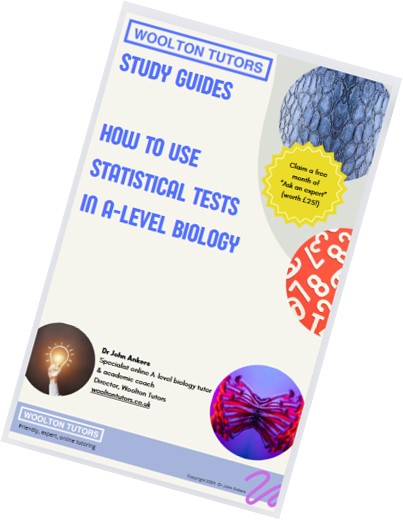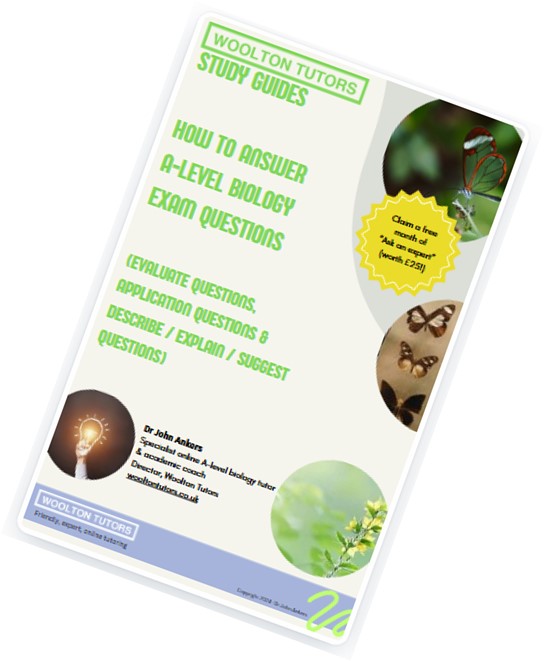Many students choose to study A-level biology as a private candidate, enjoying the flexibility of home education/ home-schooling or online education. I have helped several students find their way with the practicalities involved, like choosing an exam board and an exam centre. I have also tutored several A-level biology candidates through all or part of their course. I would like to share some of this advice with you:
How to choose an A-level biology exam board
Choosing an A-level biology course (linked with an exam board) is the first step to sitting A-level biology as a private candidate. I’ve listed some popular choices below, which are respected by universities and colleges. There are differences in their course structure and the types of questions that feature on their exams.
Each of these options involves a mixture of fact learning and recall (often referred to as Assessment Objective 1), applied knowledge (AO2) and evaluating data (AO3). They also involve practical experiments, which, while not compulsory, often help with university applications – see below. Each exam board has a “specification” document which introduces their course in more detail.
AQA A-level biology
AQA is the most popular choice for A-level biology in schools in the UK, and is perhaps also (slightly!) easier than others in terms of the exam content. However, it features a 25-mark essay question on paper 3 which some students may find challenging.
Specification document for AQA A-level biology.
Entry fees for AQA A-level biology.
There are 3 exam papers in AQA A-level biology (each 2 hours long) and 12 practical experiments (see below)
Edexcel Salters-Nuffield A-level Biology
Edexcel uses similar content to AQA, but with greater depth in certain areas. The exams are often more challenging, but reward students able to apply their knowledge and “think like a scientist”. Edexcel is often chosen for students intending to study medicine or related disciples at university because of the (slightly) greater emphasis on medical topics.
Specification document for Edexcel Salters A-level biology.
Entry fee information for Edexcel Salters A-level biology.
There are also 3 exam papers in AQA A-level biology (each 2 hours long) and 12 practical experiments (see below).
OCR A
Similar to Edexcel, OCR A is another course aimed slightly more towards thinking like a scientist, data interpretation and experimental design (AO2/ AO3). The specification for OCR was recently updated to include more up-to-date case studies.
Specification document for OCR A A-level biology
Entry fees for OCR A A-level biology
There are 3 exam papers in AQA A-level biology (each between 1.5 and 2.25 hours long) and 12 practical experiments (see below)
These are the most popular choices of course providers, but there are several other A-level biology exam boards for private candidates – including Eduqas, OCR B and Edexcel B. Please do get in touch to discuss the pros and cons of these.
Studying International A-level biology as a private candidate
Candidates outside the UK have the choice of several international A-levels. These are slightly different, but broadly equivalent in terms of UCAS and respected by universities. Please get in touch to discuss these options – or take a look at my case study on studying A-level biology in Dubai, as much of the advice applies in other parts of the world.
Choosing an exam centre for A-level biology as a private candidate
There are no options to take the A-level biology exams online… yet. The AQA is trialling a number of digital exams as an option for the future. Instead, you will need to find a local centre to sit your A-level biology exams. The Joint council for qualifications (representing all the exam boards above) has a list of approved centres – take a look to see if there is one local to you. https://www.jcq.org.uk/private-candidates/
What about practical experiments when studying as a private candidate?
School students have the opportunity to perform 12 practical experiments (see the list below) as part of their A-level biology course, towards meeting a set of standards for “thinking like scientists”. These are known as the Common Practical Assessment Criteria (CPAC) – the AQA website (for example) has information on CPAC. Completing these experiments gives you a “practical endorsement” – this does not affect your grade either way, but will appear as a tick box on your UCAS application. Some university courses look favourably or even require students to have their practical endorsement.
If you’re studying A-level biology as a private candidate, one option is to book a space at a private laboratory centre to perform the experiments and gain their practical endorsements. These can be googled, but I’m happy to discuss the options if you want to get in touch. Whichever you choose, make sure they are approved by the JCQ.
For interest, here are the 12 practical experiments:
Practical 1 – Investigation into the effect of a named variable on the rate of an enzyme-controlled reaction.
Practical 2 – Preparation of garlic root meristems to investigate stages of mitosis and calculating the mitotic index.
Practical 3 – Production of a dilution series of a solute to produce a calibration curve with which to identify the water potential of plant tissue.
Practical 4 – The effect of a named variable on the permeability of cell surface membrane.
Practical 5 – Dissection of a mammalian heart.
Practical 6 – Microbiological techniques and investigation into the effect of antimicrobials.
Practical 7 – An investigation of the pigments present in leaves.
Practical 8 – Investigation into the effect of a named factor on the rate of dehydrogenase activity in extracts of chloroplasts: the effect of ammonium hydroxide on the time taken for chloroplasts to decolourise DCPIP.
Practical 9 – An investigation of the effect of temperature on respiration in yeast.
Practical 10 – Using choice chambers to investigate responses in invertebrates to light/dark or humid/dry conditions.
Practical 11 – Use a colorimetric technique to produce a calibration curve with which to identify the concentration of glucose in an unknown ‘urine’ sample.
Practical 12 – Investigation into the effect of a named environmental factor on the distribution of a given species.
Planning your studies and getting help
Once you are enrolled on a course, your first step should be to read your exam board’s specification document. Next, purchase a textbook for your course. The biology can look daunting at first, but there is plenty of help out there.
Be wary of package courses offered on flashy websites and ask yourself: who is delivering the course? how much experience do they have? Can I meet them before I commit? Elsewhere, Student room and even Reddit have dedicated groups for A-level biology students for you to share your experience and ask for advice.
You can also consider one-to-one tutoring to support your A-level biology. I have spent over 10 years taking students through A-level biology exams on all the exam boards mentioned above. I have also helped several students studying A-level biology as a private candidate. I have written blog posts and study guides on A-level biology.
I can provide online one-to-one tutoring for all or part of your A-level biology course, as well as a regular exam technique masterclass. If this interests you, please do get in touch.
I wish you the best of luck!
John
Dr John Ankers
Director, Woolton Tutors
Specialist in online A-level biology tutoring













